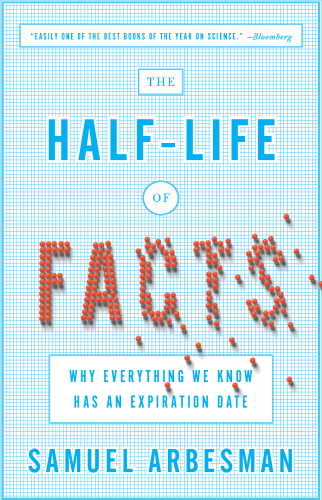
The Half-Life of Facts
Why Everything We Know Has an Expiration Date
کتاب های مرتبط
- اطلاعات
- نقد و بررسی
- دیدگاه کاربران
نقد و بررسی

September 1, 2012
Absorbing and approachable treatise on the nature of facts: what they are, how and why they change and how they sometimes don't (despite being wrong). Facts matter. But when they change--as they seem today to do with alarming frequency, we begin to lose that control. In his debut, Arbesman, a research fellow at the Institute for Quantitative Social Science at Harvard, advises us not to worry: While we can't stop facts from changing, we can recognize that what we know "changes in understandable and systematic ways." Since it is often surprisingly predictable, we can get a handle on change. "Facts, in the aggregate," he writes, "have half-lives: We can measure the amount of time for half of a subject's knowledge to be overturned." With this, he introduces "scientometrics," the science of science. With scientometrics, we can measure the exponential growth of facts, how long it will take, exponentially, for knowledge in any field to be disproved--say, 45 years for medical knowledge. We can understand predictably how the spread of knowledge (even incorrect knowledge) occurs, and we can understand that those abrupt disconcerting changes that seem to stand the world on its head aren't really all that surprising. Some readers may lose interest as Arbesman discusses such esoteric topics as logistic curves, linked S-curve theory, semantic and associative data processing and actuarial escape velocity. But like a good college professor, Arbesman's enthusiasm and humor maintains our interest in subjects many readers may not have encountered before. Does what popular science should do--both engages and entertains.
COPYRIGHT(2012) Kirkus Reviews, ALL RIGHTS RESERVED.

October 1, 2012
There are facts, and then there are facts. We expect some facts to be fluidthe population of Earth, for examplebut, as it turns out, we probably shouldn't expect anything we know to remain static. Things that feel like unalterable truths, like the number of chromosomes in human cells (which was 48, until somebody noticed it wasn't), can suddenly shift. The author, an applied mathematician, explores the nature of knowledge: why it changes, how it changes, and why this is so vital for scientific exploration. Knowledge, like life itself, evolves; science regularly revises its truths to include new discoveries. The book is also a history of a field many readers might never have heard of: scientometrics, the science of science, a way of quantifying the growth of ideas. The author shows, too, how the principles of scientometrics can be applied to other fields, examination of various surviving copies of Chaucer's The Canterbury Tales, for instance, allowing researchers to track back to Chaucer's own original version. Fascinating, engagingly written, and just mind-bending enough to spur readers to revisit their own mental catalogs of knowledge.(Reprinted with permission of Booklist, copyright 2012, American Library Association.)

























دیدگاه کاربران